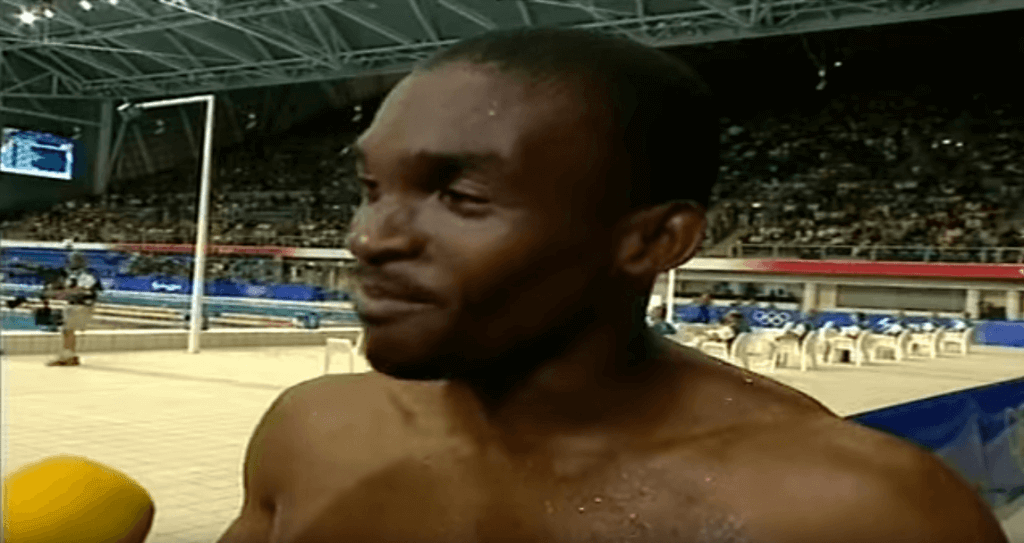Eric the Eel: The Swimming Underdog

By Joe Buchanan, Swimming World College Intern.
On the block, ready to dive. The entire world watching him. A man that had never seen a 50-meter pool before competing in the 2000 Olympic Games was poised to dive. The two competitors that were set to compete in his heat had false started leaving Eric “the Eel” Moussambani as the only competitor in this heat of the 100-meter freestyle. Hundreds of thousands of people watched Moussambani represent his country alone, on the world stage.
Moussambani represented Equatorial Guinea, a developing country in western Africa. Equatorial Guinea was accepted into the Olympics as a ‘wild-card’ country, a method the Olympic Committee uses to encourage developing countries to join-in on the Olympics. This ‘wild card’ status meant that athletes from Equatorial Guinea could skip the qualifying rounds of events. So Moussambani began his competitive swimming career at the Olympics.
Equatorial Guinea did not have any 50-meter pools prior to the 2000 Olympics, which left Moussambani at a disadvantage. After being named the swimmer for Equatorial Guinea, Moussambani had eight months to become an Olympic swimmer. The only pool Moussambani could practice in was a 13-meter hotel pool that the hotel allowed him to swim at for one hour a day, three days a week. He also practiced in rivers and lakes, where fishermen would show him how to kick his feet.
When the Olympics began Moussambani’s practice was set the same time as the United States Olympic team. He spent his practices watching the U.S. swimmers and their training methods. He asked other athletes and coaches to teach him how to dive, flip turn, and improve his form. While some ignored Moussambani, plenty of athletes worked with him and helped develop him into a swimmer. The South African swim coach took Moussambani under his wing and taught him the proper form to swim the 100-meter freestyle.
The day that Moussambani took the blocks he was joined by two other competitors. A swimmer from Niger and a swimmer from Tajikistan, both swimmers were allowed into the Olympics under the same ‘wild-card’ program Moussambani was.
Following the false start of the other two athletes, Moussambani was nervous, but returned to the block to swim his event. His dive, his swim, and his flip turn were far from perfect. He spent most of his energy within the first 25 meters. He kept his head above the water for much of the event. But as Moussambani neared the wall the cheers from the audience exploded. Everyone in the audience were supporting Moussambani as his stroke slowed to a crawl. He touched the wall with a time of 1:52.72, a record for the slowest Olympic time to win a 100-meter freestyle heat.
It was not the time that was the reason Moussambani is an inspiring figure, it is his will. An underdog story of a man who had never even seen an Olympic size pool, that decided to undergo the challenges of an Olympic swimmer. Moussambani trained as much as he could to represent his home country on the world stage. He knew he wouldn’t be the best, but he still decided to push himself and to compete.
Moussambani did not retire following his Olympic debut. Due to an issue with his visa, he was unable to compete in the 2004 Olympics, but continued to swim.
Moussambani still continues to swim and teaches others as well. Since the 2000 Olympic Games, Equatorial Guinea has built a 50-meter pool. Moussambani began coaching swimmers, and encourages children from Equatorial Guinea to choose swimming over crime or trouble.
In 2012 he became the head coach of the Equatorial Guinea National Swim Team. He hopes one day to coach another Equatorial Guinean swimmer that will reach the Olympics.
Watch Moussambani’s historic swim:
All commentaries are the opinion of the author and do not necessarily reflect the views of Swimming World Magazine nor its staff.



